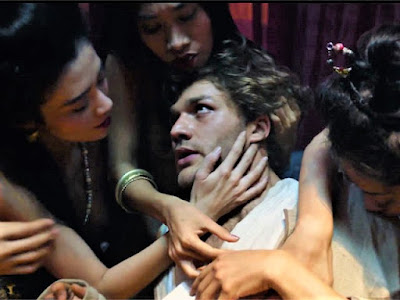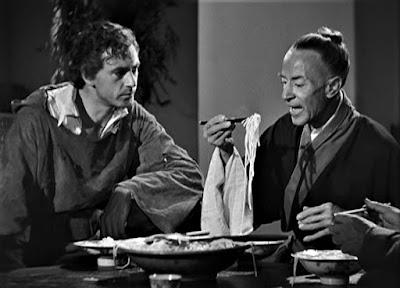
Benedict Fong as Kublai Khan and Lorenzo Richelomy
as Marco in Netflix' MARCO POLO
NUDE KUNG FU
A substantial fort of logs used to stand (and perhaps still does) just over the border into former Yugoslavia, a survival of the 1965 Omar Sharif/Françoise Dorleac Genghis Khan and a monument to the hubris of Europeans who apply European sensibilities to Mongols.
Netflix has a similar white elephant in the 2014 series Marco Polo, which has just returned to the front rank of its programming, in painful juxtaposition to a re-run of the effortfully expert Downtown Abbey. The company’s first attempt at independent production and a disastrous one, Marco Polo shut down at the end of its second year with a $200 million loss.
Eight directors from widely diverse backgrounds shot the work of ten writers in Hungary, Slovakia, Kazakhstan and Malaysia, with an Italian star but an almost entirely Asian cast, including two token Mongols, one of whom, Baljinnyamyn Amarsaikhan, takes a large share of the meagre acting honours for his performance as Ariq, thoughtful and troubled younger brother of Kublai Khan, a far more subtle characterisation than Benedict Wong’s B-movie Kublai.
As one of the few Occidentals in the series, Lorenzo Richelmy as Marco is repeatedly marginalized by such veterans as Tom Wu, who does a star turn as the blind Shaolin master Hundred Eyes. So effective was his portrayal that Netflix starred him in a mid-season feature, Marco Polo: Hundred Eyes.
Chin Han also makes the most of devious Chancellor Jia Sidao, demolishing bare-handed a man twice his size who suggests that contemplating praying mantises (key to the Southern Chinese school of martial arts) represents no more than “an unusual hobby”. The feat is nothing, however, beside that of Olivia Chang, who, naked, vamps three fully-armed soldiers who invade her boudoir, and kills them all.

Lorenzo Richelmy's Marco in the
House of Five Desires
Nudity is commonplace in the series, which is not to say it’s particularly erotic. Scenes set in Kublai’s harem, the House of the Five Desires (only five?), give more time to Ray Tan Seok Yuan’s self-important Court Eunuch who marshals and lectures his charges while they stand in line, naked, silent and resigned, like army recruits on “short arm” parade.
As the Venetian teenager abandoned by his father and uncle as they hurry off to develop a trade route along the Silk Road, Richelmy has little to do but hang about and look soulful. Marco Polo is not his story at all but a drama of political chicanery in 13thcentury China, to which he is little more than a baffled observer.

Gary Coooer, Basil Rathbone, George Barbier
and Sigrid Gurie in THE ADVENTURES OF MARCO POLO
The predominantly Asiatic cast of Marco Polo stands in marked contrast to Sam Goldwyn’s 1938 The Adventures of Marco Polo, in which, among the major roles, there is not a single Asian face. Gary Cooper plays Marco, George Barbier, formerly King Achmed II in Lubitsch’s The Merry Widow, is Kublai Khan, portly Robert Greig, archetypal gentleman’s gentleman, is his chamberlain, and Basil Rathbone, without even the perfunctory concession of slanted eyes, the evil adviser who plots his overthrow. One may also spot Lana Turner as a maid and veteran stunt man cum character performer Richard Farnsworth as a Mongol warrier.
John Cromwell began as director, approaching the film in the tongue-in-cheek style of Robert E. Sherwood’s script, a kind of Venetian Yankee in Kublai Khan’s Court.Cooper protested, so journeyman Archie Mayo stepped in. The wild improbabilities remain, however, resistant even to Mayo’s pedestrian style.
Love interest is provided by Sigrid Gurie, advertised as Norwegian but actually born in Brooklyn, whom Marco introduces to the supposedly uniquely European practice of kissing. Some low comedy ensues as a minion, set to spy on the couple, describes their exotic behaviour to Rathbone, then tries to demonstrate on a disgusted male colleague.

Gary Cooper as Marco learns from H.B. Warner
how to eat spaghet in
THE ADVENTURES OF MARCO POLO
Marco, inevitably, returns to Venice with two major Chinese contributions to Western culture, gunpowder and a dish called, if we are to believe a synthetically Chinese H.B. Warner, spaghet. Audiences of the time were no more impressed with this film than modern viewers with Marco Polo, and it also was an expensive flop. Which of the two is the more unlikely? I’d say it’s too close to call.
MARCO POLO is on Netflix. A superior copy of THE ADVENTURES OF MARCO POLO is streaming here
No comments:
Post a Comment
Note: only a member of this blog may post a comment.